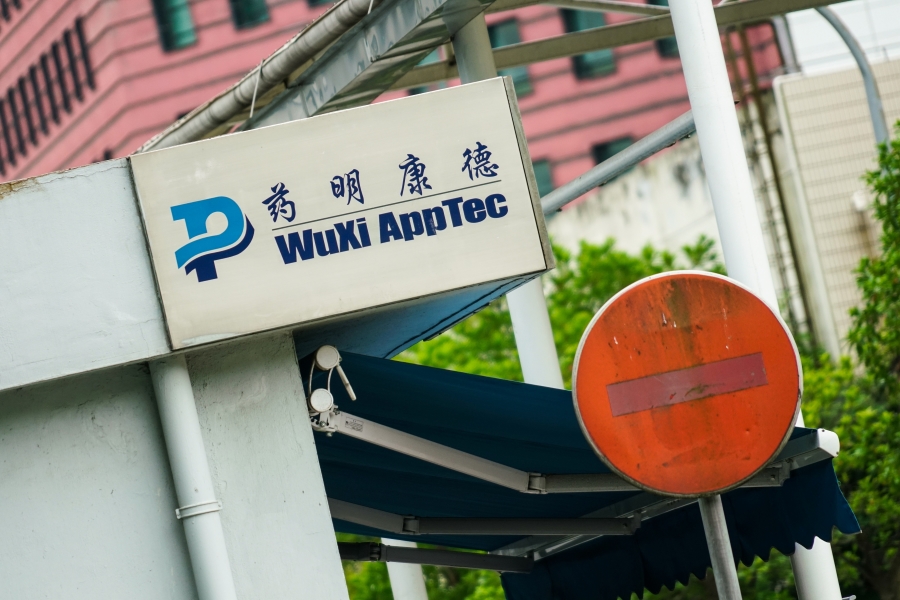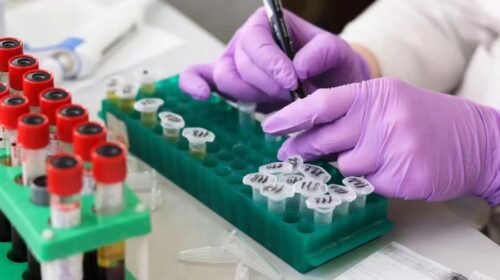WuXi AppTec Revenue Soars as Changing Government Policies Bring Headaches

The CXO giant announced it expects to post record-high revenue in the first quarter of 2022
Key takeaways:
- WuXi AppTec said it expects year-on-year revenue growth of 65% to 68% in the first quarter of this year
- The provider of drug development services is ranked relatively weaker than its peers, as the entire group faces both internal and external policy risks
By Molly Wen
If nothing else, the past two years have sparked a gold rush in medical research as companies realize the riches to be had by bringing innovative new drugs quickly to market. If companies undertaking such research are the gold prospectors, then a more unsung group that offers drug R&D outsourcing services provides the fuel that lets the machine run smoothly.
And while investment in medical innovation yields returns only over long periods, quicker and more reliable returns can come for such R&D outsourcing specialists, known in the industry as Contract X Organizations or CXOs. One of China’s leaders in that space is WuXi AppTec Co. Ltd. (2359.HK; 603259.SH), an analyst favorite that published results for the first two months of this year last week.
WuXi AppTec has been reporting faster revenue growth in recent years, and by the fourth quarter of last year had logged seven consecutive quarter-to-quarter revenue increases.
The positive trends continued in the first two months of the year. Both its outstanding orders and revenue in January and February increased by more than 65% year-on-year, reaching a record high, as the company estimated its first-quarter revenue would grow 65% to 68% year-on-year. Such a release of data from just two months is slightly unusual for listed companies. But WuXi AppTec’s managers might simply be eager to share their good news with the market.
Founded in 2000, WuXi AppTec is China’s biggest CXO with a broad scope covering everything from drug discovery to commercialization. It posted an impressive performance in 2021, with revenue up 38.5% for the year to 22.9 billion yuan ($3.59 billion) and net profit up 72.2% to 5.1 billion yuan.
Its portfolio has five major components, including the development and production of chemical drugs; biological research; and providing drug development services to other companies. Chemical drug-related work forms its largest revenue source, posting 46.9% growth to rake in 14.09 billion yuan in 2021, accounting for 61.5% of total revenue.
The Covid-19 pandemic has further fed the fervor for development of innovative drugs. As it delivers services for the development of Covid-related drugs, WuXi AppTec expects its revenue stemming from development of chemical drugs to nearly double this year from 2021 levels.
Policy blows
But not everything has been smooth sailing for the company. Last July China’s Food and Drug Administration released new guidelines for clinical research and development of anti-cancer drugs, which many believe have negative implications for the popular “fast-follow” drug development model that is one of WuXi AppTec’s main sources of business.
Many Chinese companies have adopted the model, which sees them engage in the development of drugs with marginal differences over existing drugs to avoid patent infringements. The new policy aims to force companies to move from simple tweaking and tinkering to truly original innovation at the source to better meet the needs of cancer patients.
The intentions are good, but the shift could bring down demand for drug development under the “fast-follow” model, denting orders for CXO companies like WuXi AppTec in the process. That means the company’s domestic drug development business is likely to take a hit and become less profitable.
The company’s stock has been on a roller-coaster ride over the past year amid all the developments. It remained resilient in the first half of last year, even as other medical stocks nosedived, with the shares soaring to a record-high of HK$196.90 last July. But they have stumbled since last August.
The company’s shares jumped 8.6% last Thursday after it released the operating data for January and February. But the rally lasted for just one day. Three U.S.-listed Chinese medical stocks were put on a list issued by the U.S. securities regulator for potential delisting last week, sparking a medical sector selloff that also dragged down WuXi AppTec’s shares by 4.3% last Friday.
There was more bad news this Tuesday, as market rumors emerged saying China’s National Health Commission was examining the appropriateness of profit-seeking medical institutions going public and raising capital. WuXi AppTec plunged 10.3% to HK$83.60 that day, putting it down 58% from last year’s high.
This certainly wasn’t the first time the company’s stock has suffered as a result of changing government policies. On Feb. 7 the U.S. Department of Commerce put 33 Chinese entities on an “unverified list” subjecting them to export controls. That group included a subsidiary of WuXi Biologics (2269.HK), which is also a CXO company. WuXi AppTec announced that U.S. move would not affect its operations and it did not hold any WuXi Biologics’ stock. But that did little to calm the market, and WuXi AppTech’s Shanghai-listed shares fell 10% the next day in the A-shares market, and declined 11.3% in Hong Kong.
The company is sensitive to U.S. sanctions because its overseas business accounts for more than 70% of its revenue. According to its interim financial report for the first half of last year, its U.S. and European operations contributed 5.83 billion yuan and 1.49 billion yuan, respectively, accounting for 55% and 14% of its total revenue for the period. By comparison, the Chinese market only took up 24% of the total. Uncertainties surrounding the China-U.S. relationship are likely to persist as a cloud over the company’s future development.
But investors are still broadly confident about the company’s prospects as both overseas and domestic demand for pharmaceutical services are expected to remain strong.
Middling valuation
Guosen Securities pointed out that the company is the unequivocal leader in the Chinese CXO industry and can attract abundant orders and high customer loyalty due to its high-caliber research team and complete industrial chains.
Despite that, its valuation is currently a bit low compared with other key sector players. As of last Friday, its Hong Kong shares had a price-to-earnings (P/E) ratio of around 48 times, while its Shanghai-listed A-shares traded at 57 times. That was lower than peer Asymchem Laboratories (6821.HK; 002821.SZ), whose P/E ratios stood at 58 and 97 times for its Hong Kong- and Shenzhen-listed A-shares, respectively. Another peer Pharmaron (3759.HK; 300759.SZ) has P/E ratios of 31 and 60 times, respectively, for its Hong Kong and Shenzhen-listed A-shares. All that suggests that WuXi AppTech is lowly-priced in the A-share market and is a middling stock in Hong Kong.
Guosen Securities assumes the company’s share of the global contract research organization (CRO) market can grow from 2.1% in 2019 to 15% in the next decade, and its share of the contract development and manufacturing organization (CDMO) market can rise from 0.7% to 8%. It forecasts the company’s revenue will reach 213.1 billion yuan by 2030, yielding a profit of 50.1 billion yuan.
But its exposure to domestic policy risk and foreign restrictions will remain potential pain points for the company, especially due to its reliance on overseas revenue. At the same time, the company does look well positioned to benefit from a post-Covid spending boom on new drug development.
To subscribe to Bamboo Works free weekly newsletter, click here





